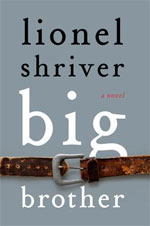I’m thrilled to introduce Bookgaga blog visitors to another lively and insightful guest book reviewer. Ruth Seeley rattles cages for a living via Twitter and at No Spin PR and occasionally reviews books on her blog and Goodreads.
Some Straight Talk About Big Brother by Lionel Shriver

Write a novel about The Post-Birthday World of a woman who leaves her sensible partner for a much sexier one – or not.
Write a novel about being the mother of a school shooter in the wake of Littleton, CO. We Need to Talk About Kevin.
Write a novel about the vaunted US health care system no one can ultimately afford. The one that puts profit ahead of quality of life. So Much for That.
Write a novel about The Troubles when you’re handicapped by having been born American. Welcome to The New Republic.
Write a novel about an anthropologist – The Female of the Species – who can’t resist a man she knows she should.
Write a novel about letting your Big Brother die from gluttony. Or not.
It’s hard to resist the temptation to reduce Lionel Shriver’s subject matter to exercises en style sometimes, because she persists in tackling big subjects. But despite the assertion on one of the front end papers that, ‘The dieting industry is the only profitable business in the world with a 98 percent failure rate,’ Big Brother is not about the dieting industry at all. It’s not even about the politics of obesity.
‘I have spent less time thinking about my husband than I have thinking about lunch,’ says Pandora Halfdanarson on the first page of Big Brother. Married to Fletcher, Edison’s perpetual little sister, daughter of a 70s sitcom star, Pandora’s an ex-caterer turned nasty Chatty Cathy doll manufacturer for the rich and passive aggressive. So it’s perhaps not surprising that she’s spent more time thinking about lunch and amuse-bouches than her husband. She’s married late and is raising two step-children. And she’s a busy woman. Her doll business is getting some national attention (think Newsweek cover), yet she feels a sibling twang when Edison’s friend Slack tells her he’s down on his luck. So down on his luck he’s unrecognizable when she picks him up at the airport for an extended stay, as he’s worn out his couch-surfing welcome in New York. The fat smelly guy in the wheelchair everyone who’s deplaning is complaining about is actually Pandora’s brother! How humiliating.
Pandora, whose brother has always loomed large in her life, makes it her mission to restore him – at least on the surface – to her image of her big brother as he was – big in the figurative but not literal sense. She herself manages to lose 60 pounds – 20 more than she needs to – and Edison loses closer to 200 after a year of serious exercise and not-so-closely supervised starvation. Herbal tea FTW! In order to accomplish rehab conditions, Pandora moves her brother out of the family home and into an apartment, abandoning husband and step-children. Since Fletcher is a very fit, cycling and raw food fanatic, it’s not quite clear why this is necessary, but never mind. Edison – whose jazz pianist career is on the rocks, having copped Keith Jarrett ‘tude without actually Keith – becomes a productive member of society, takes a day job in Pandora’s factory and reasserts his sexuality by having a one-night stand with a not-unattractive younger woman (enabled in this endeavour by sister Pandora, who’s replaced his buttery leather black jacket to aid in the restitution of her brother’s image as ‘jazz stud’). Or does he/do they?
Like all Shriver’s women, Pandora is a high achiever. The least competent of Shriver’s women are, at the very least, more than capable of supporting themselves nicely and supremely competent in their fields. But Pandora may well be Shriver’s least accessible and least charming character, and in a novel where the protagonist is a buffoon (of not-quite-Monty Python dimensions) and the antagonist remains shadowy (an angry cycling gnat, munching aggressively on celery stalks), the reader feels the loss of a plausible omniscient third-person narrator. Pandora’s not to be trusted. And with its surprise ending, Shriver proves she can’t be trusted either. And by that I mean, she refuses to write about we might like her to write about.
Ultimately, like all of Shriver’s novels, Big Brother is about family – or rather families. Dread families of origin, families we create, the collisions between the two; the children, parents, siblings and exes left in our wake; and ultimately our need to be known to a select group of individuals in a way far deeper and more significant than the personae we present to the world.
